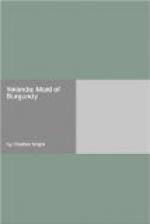In imitation of King Louis’s Scotch guard, Charles had an Italian guard. The wide difference in the wisdom of these princes is nowhere more distinctly shown than in the quality of the men they chose to guard them. Louis employed the simple, honest, brave Scot. Charles chose the most guileful of men. They were true only to self-interest, brave only in the absence of danger. The court of Burgundy swarmed with these Italian mercenaries, many of whom had followed Charles to Peronne. Count Campo-Basso, who afterward betrayed Charles, was their chief. Among his followers was a huge Lombard, a great bully, who bore the name of Count Calli.
On the evening of which I speak Max had hardly stepped on the bridge when Yolanda ran to him.
“I have been waiting for you, Sir Max,” she said. “You are late. I feared you would not come. I have waited surely an hour, though I am loath to confess it lest you think me a too willing maiden.”
“It would be hard, Fraeulein, for me to think you too willing—you are but gracious and kind, and I thank you,” answered Max. “But you have not waited an hour. Darkness has fallen barely a quarter of that time.”
“I was watching long before dark on the battlements, and—”
“On the battlements, Fraeulein?” asked Max, in surprise.
“I mean from—from the window battlements in uncle’s house. I’ve been out here under the trees since nightfall, and that seems to have been at least an hour ago. Don’t you understand, Sir Max?” she continued, laughing softly and speaking as if in jest; “the longer I know you the more shamefully eager I become; but that is the way with a maid and a man. She grows more eager and he grows less ardent, and I doubt not the time will soon arrive, Sir Max, when you will not come at all, and I shall be left waiting under the trees to weep in loneliness.”
Max longed to speak the words that were in his heart and near his lips, but he controlled himself under this dire temptation and remained silent. After a long pause she stepped close to him and asked:—
“Did you not want me to come?”
Max dared not tell her how much he had wanted her to come, so he went to the other extreme—he must say something—and, in an excess of caution, said:—
“I would not have asked you to come, Fraeulein, though I much desired it; but sober judgment would prompt me to wish that—that is, I—ah, Fraeulein, I did not want you to come to the bridge.”
She laughed softly and said:—
“Now, Little Max, you do not speak the truth. You did want me to come, else why do you come to the bridge? Why do you come?”
In view of all the facts in the case the question was practically unanswerable unless Max wished to tell the truth, so he evaded by saying:—
“I do not know.”
She looked quickly up to his face and stepped back from him:—
“Did you come to see Twonette? I had not thought of her. She is but drained milk and treacle. Do you want to see her, Sir Max? If so, I’ll return to the house and send her to you.”




